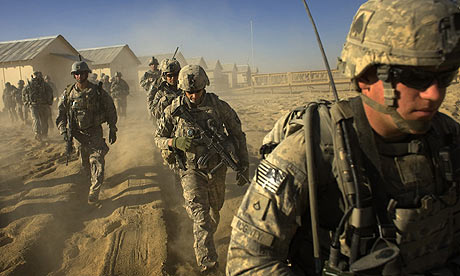Pentagon Report Prepares For US Pull Out From Afghanistan
Copy of US troops set out on a patrol in Paktika province, Afghanistan
NEW DELHI: A new report by the United States Department of Defense on the “Progress Toward Security and Stability in Afghanistan” was submitted to the US Congress. The report focuses on milestone events that have set the stage for ending the U.S. combat mission in Afghanistan by the end of 2014 and transitioning to a train, advise, and assist mission within the context of an enduring U.S.-Afghanistan partnership.
The report outlines factors such as the failure of any candidate to win more than 50 percent of the vote in the April 5 presidential election, the disputed outcome of the June 14 runoff election, and former President Karzai’s refusal to sign the Bilateral Security Agreement and NATO Status of Forces Agreement (SOFA), as reasons for uncertainty in Afghanistan, especially relating to the future of US coalition forces as their presence in Afghanistan is directly linked to the fate of the BSA. The report further links this uncertainty to a slowing economy and declining government revenues, and postulates that with a new President -- Ashraf Ghani -- being sworn in and the signing of the BSA and SOFA, uncertainties in Afghanistan have been mitigated. However, it cautions that new government will face significant challenges in dealing with the ongoing insurgency, potential resistance to its reform agenda, and Afghanistan’s continued reliance on international financial assistance.
The three areas that emerge in the paragraph above form the crux of the report: the political transition in Afghanistan, the BSA and the changing role of foreign assistance, and the insurgency being waged by the Afghan Taliban.
Referring to the threat posed by the Taliban, the report stated that “the insurgency remained resilient and continued to pose a threat to U.S. and coalition forces and Afghan civilians during the reporting period.” During this reporting period, the United States suffered 264 wounded-in-action (WIA) and 24 killed-in-action (KIA). Insurgents also remained responsible for most civilian casualties (CIVCAS), largely due to their sustained use of indiscriminate improvised explosive devices (IEDs). In fact, independent studies have concluded that civilian casualties in Afghanistan have been on the rise. The United Nations Assistance Mission in Afghanistan (UNAMA) began compiling civilian casualties relating to the war in Afghanistan since 2007, and estimates that 11,614 Afghan civilians have died since.
The report goes on to add that insurgency in Afghanistan has failed to achieve its intended goals. “One of the Taliban movement’s primary goals and its main propaganda focus at the beginning of this reporting period was to disrupt both the first and second rounds of the Afghan presidential election. The widespread turnout and desire of the Afghan electorate to vote, combined with a robust ANSF security posture during the electoral period, dampened the Taliban’s ability to disrupt the election,” the report stated.
In reference to the changing role of US troops, the report notes that United States intends to maintain a military presence of approximately 9,800 personnel in Afghanistan beginning January 1, 2015, to pursue two separate but linked missions. First, the United States will provide the bulk of forces for the NATO-led train, advise, and assist (TAA) mission, known as Resolute Support, to develop further Afghan security institutions (ASI) and their capabilities, enabling them to conduct the various national-level functions that are crucial to generating, resourcing, and sustaining fielded forces. Second, as Operation Enduring Freedom comes to an end on December 31, 2014, the remainder of U.S. forces will continue to put pressure on the remnants of core al Qaeda and its affiliates in the U.S. counterterrorism (CT) mission.
Noting that the recently concluded have marked a political transition in Afghanistan, the report says that although allegations of fraud marred the election, it was otherwise successful in terms of security, participation, and inclusivity. It further highlights the role of the Afghan Security Forces (ANSF) in ensuring a peaceful election, saying that they demonstrated their improved capabilities by securing campaign events, many of which had high public turnouts. “While the Afghan government and international community worked through the political turmoil during the election process, the ANSF increased their credibility among the Afghan people by countering and preventing insurgents’ efforts to disrupt the elections, providing security during the election campaigns, and remaining cohesive and nonpartisan during the elections’ aftermath,” the report noted. However, “the coalition’s role remains critical in supporting ANSF development, which will be the focus of the Resolute Support mission,” it added.
A small section of the report examined the situation in Pakistan, saying, “the resiliency of the Afghan insurgency continues to depend on sanctuary in Pakistan, making an effective relationship between Afghanistan and Pakistan critical to long-term stability in the region. Both countries’ leaders have expressed interest in a stronger military-to-military relationship in the post-Karzai era, and Pakistan maintains a public commitment to supporting Afghan-led reconciliation. Nonetheless, Afghan-focused militants continue to operate from Pakistan territory to the detriment of Afghan and regional stability.”
In reference to this specific paragraph, India’s Ministry of External Affairs issued a statement welcoming the Pentagon’s analysis. If international community is now acknowledging the fact that terrorism derives support from Pak, its something that we welcome," Syed Akbaruddin, MEA spokesperson, said.





